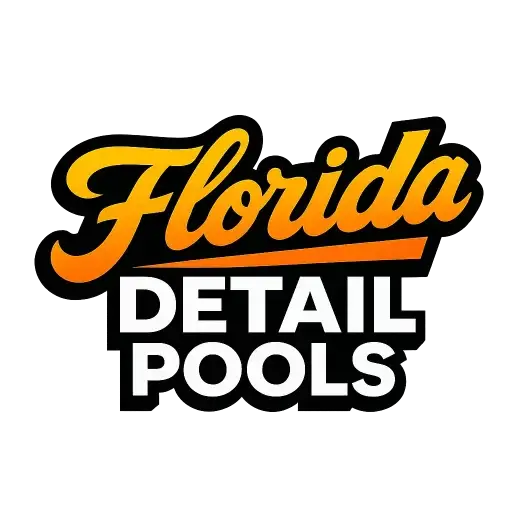Understanding Hard Water Issues in Florida Pools
If you live near the coast—whether in Port Charlotte, Punta Gorda, North Port, or Rotonda West—you’ve likely noticed cloudy pool water, stubborn scale on tiles, or rough pool surfaces. These are all signs of hard water, a common issue for homeowners across Charlotte County.
Florida’s coastal aquifers are naturally rich in minerals like calcium and magnesium, which easily build up inside pools. Over time, this can reduce water clarity, damage your pool’s finish, and even affect your filtration system’s performance.
Callout: Hard water doesn’t just look bad—it can shorten the lifespan of your pool equipment and surfaces if left untreated.

Why Florida Pools Are Prone to Hard Water
Florida’s sunshine and high evaporation rates concentrate minerals in pool water. Combine that with the region’s coastal limestone base, and you get elevated calcium hardness levels.
Common Causes Include:
- Evaporation: Water leaves, minerals stay.
- High local water hardness: Common across Charlotte County wells.
- Rainwater and runoff: Add trace minerals.
- Improper chemical balance: Low pH or alkalinity can make calcium precipitate faster.
Many residents notice scale after summer rains or during snowbird season, when pools sit unused and untested for weeks.
Step-by-Step: How to Test Your Pool for Hard Water
Testing water hardness isn’t complicated—especially with Florida’s frequent maintenance needs. Here’s how you can do it yourself:
1. Use a Pool Test Kit
Pick up a calcium hardness test kit from your local pool supply or during your next service from Florida Detail.
- Dip the strip into pool water for 10 seconds.
- Match color results to the hardness chart.
- Ideal range: 200–400 ppm (parts per million).
2. Use a Digital Pool Tester
Digital testers give you instant readings for calcium hardness, pH, and TDS (total dissolved solids).
Many pool cleaning in Charlotte County professionals rely on these tools for precision.
3. Send a Sample for Lab Analysis
For severe scale issues, send a water sample to your nearest pool company like PortCharlottePoolService.com. They’ll measure mineral balance and suggest a custom treatment plan.
Fixing Hard Water Problems in Coastal Florida Pools
Once you’ve confirmed high calcium levels, it’s time to correct them. Here’s how:
1. Partially Drain and Refill the Pool
The most effective way to reduce hardness is by diluting your water.
- Drain about ⅓ of your pool.
- Refill with softened or fresh municipal water.
- Retest calcium hardness afterward.
⚠️ Pro Tip: Always refill slowly to avoid liner damage—especially under hot Florida sun.
2. Use a Sequestering Agent
These chemicals “bind” minerals so they don’t form scale.
Add a metal and scale control product monthly, particularly during hot, dry months in North Port or Rotonda.
3. Adjust Pool pH and Alkalinity
High pH encourages scale buildup. Keep:
- pH between 7.2–7.6
- Alkalinity around 80–120 ppm
Routine checks through Florida Detail’s services help maintain this balance.
4. Try Reverse Osmosis (RO) Filtration
Some advanced pool service companies in Punta Gorda use mobile RO units to clean pool water without draining.
It removes excess minerals and improves water texture instantly.
How to Prevent Hard Water from Returning
Florida’s weather makes prevention just as crucial as treatment.
Top Prevention Tips:
- Test weekly – especially after storms or heavy rainfall.
- Use a pool cover – limits evaporation and mineral buildup.
- Maintain proper pH balance year-round.
- Clean tile lines monthly with vinegar or scale remover.
- Schedule professional service – Experts at NorthPortPoolCompany.com or PoolCleaningInPortCharlotte.com can test hardness and make adjustments.
Local Example: Port Charlotte Pool Owner’s Experience
A Port Charlotte homeowner recently noticed white film forming on pool tiles.
After testing, calcium hardness read over 700 ppm—well above normal.
The solution? A partial drain, fresh water refill, and monthly calcium sequestering treatments. Within weeks, the pool looked crystal clear again.
“We used Florida Detail for the testing and maintenance plan—absolutely worth it,” the homeowner shared.
When to Call a Professional
If you’ve:
- Refilled the pool multiple times,
- Tried balancing chemicals, and
- Still see rough or cloudy surfaces…
…it’s time to get help. A professional pool cleaning in Charlotte County provider can analyze hardness, apply the right products, and restore balance safely.
Local experts from PoolServiceInPortCharlotte.com or NorthPortPoolServices.com specialize in hard water solutions for coastal pools.
For broader home or pool marketing resources, check out UnlimitedManiac.com—a great hub for local SEO and digital growth tools.
Final Thoughts: Clear Water, Clear Plan
Hard water problems in Florida pools don’t have to ruin your summer. With regular testing, smart chemical balance, and help from trusted experts in Charlotte County, your pool will stay sparkling—even in the salty air of Port Charlotte or Punta Gorda.
Ready to test your pool or get a hardness check?
Visit Florida Detail or explore our Services and Contact pages to connect with a professional near you.
